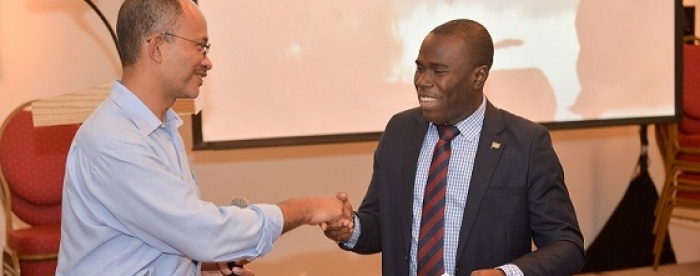Nieuws
Onze verhalen

Suriname - 24 juli, 2018
Als onderdeel van ons Land Use Planning project dat in 2013 van start ging, heeft Tropenbos Suriname een 1-daagse seminar gehouden: 'Duurzame landgebruiksplanning in regio's van inheemse en tribale volkeren' voor beleidsmakers en vertegenwoordigers van de overheid, NGO's, de particuliere sector en de lokale bevolking. Dit seminar is een voortzetting van de activiteiten in het Boven Suriname riviergebied, waar twee 3D landgebruikskaarten werden geproduceerd met en voor de gemeenschappen. Naast de 3D kaarten, werd een beoordeling uitgevoerd van de ecosysteemdiensten in het gebied en werden participatieve scenario's voor de toekomst ontwikkeld. Een beleidsdocument ' Saamaka Lio als leefgebied en productief landschap: Lessen voor inclusieve en duurzame landgebruiksplanning uit het Boven Suriname riviergebied' is geproduceerd en gepresenteerd tijdens dit seminar. Het uiteindelijke doel is dat alle informatie zoveel mogelijk beschikbaar is en door gemeenschappen en beleidsmakers wordt gebruikt als een planningstool om een duurzame ontwikkeling tot stand te brengen ten bate van mensen, de natuur en ons land.
Tropenbos Suriname is begonnen met het toepassen van de Natural Capital Benadering als onderdeel van het Land Use Planning project door de Trade-Off! Game aan te passen naar de Surinaamse context. Door het introduceren van de Trade-Off! Game hebben we de gelegenheid gehad om stakeholders bij ons project te betrekken, inzicht te krijgen in hun visie op het studiegebied boven de Surinamerivier en een platform voor verdere samenwerking te consolideren, inclusief het initiëren van een scenario-ontwikkelingsproces.
Het seminar was zeer informatief en benadrukte de noodzaak om natuurlijke hulpbronnen en lokale belangen in ruimtelijke ordening te betrekken. De Natural Capital Benadering biedt mogelijkheden om dit te doen. Naast voorbeelden van deze organisatie konden Tropenbos Suriname, de Stichting voor Inheemse Dorpshoofden in Suriname (VIDS), WWF en Iwokrama Research Center hun werk tentoonstellen. Ongeveer 60 mensen, verdeeld in vijf groepen, konden de Trade-Off! Game spelen en de noodzaak ervaren om plekken van biodiversiteit in landordening te beschouwen. Het seminar werd afgesloten met een paneldiscussie. Als een spin-off effect waren stakeholders erg geïnteresseerd in het gebruik van de Trade-Off! Spel als een leermiddel in verschillende organen voor ruimtelijke ordening.
Het seminar werd direct gevolgd door een tweedaagse training: 'Inleiding tot de Natural Capital Benadering en InVEST Software Suite-methode' voor personeel van organisaties die werken met GIS en ruimtelijke ordening, zoals de Stichting voor Bosbeheer en Bostoezicht (SBB), Anton de Kom Universiteit van Suriname, Centrum voor Landbouwkundig Onderzoek in Suriname (CELOS), VIDS, Amazon Conservation Team, Green Heritage Fund Suriname, Conservation International Suriname, de UNDP, het Nationaal Planbureau en verschillende ministeries, zoals Natuurlijke Hulpbronnen; Landbouw, Veeteelt en Visserij; en Openbare werken en Communicatie. De twee Natural Capital trainers presenteerden verschillende modellen en tools die van nut kunnen zijn bij de besluitvorming over landgebruik in Suriname. Deze ervaring zal helpen om de informatie te vertalen wanneer de deelnemers vergelijkbare benaderingen en hulpmiddelen toepassen in hun eigen onderzoeksprogramma of werkgebieden. Aan het einde van de training ontvingen de deelnemers hun certificaat voor succesvolle deelname.
De laatste activiteit was een tweedaagse veldreis om de buitenlandse gasten kennis te laten maken met het veld en om mogelijkheden voor verdere samenwerking te verkennen. Het Natural Capital Project toonde interesse om contact te houden met Tropenbos Suriname en de andere organisaties die betrokken zijn bij de training, en Iwokrama Research Center toonde belangstelling voor samenwerking met Tropenbos Suriname.